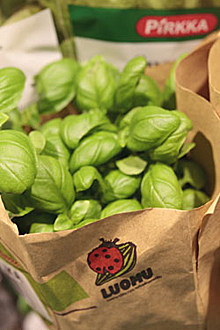

Viewpoints
Viewpoints is a blog in which different writers express their views and opinions on current topics. A new blog post is published about once every four weeks.
You can propose texts by e-mail to viestinta@kesko.fi. The maximum text length is 2,000 characters.
Organic, please!
Organic food is gaining enormous popularity. The food of individual thinkers and the elite is becoming a part of everyday life, as Finland finally catches up with the rest of the world. However, our organic food supply chain still has some room for improvement, both structurally and attitudinally. We have good reason to choose organic food: it is good for the environment, for animals and for people.
Nevertheless, the organic food supply chain has made some giant leaps during the past couple of years. Whereas we used to have production but no demand, we now have an increasing shortage of raw material. Stores are competing over who has the best organic food selection or the finest organic private-label products. Some have even created their own organic food departments. The problem remains that the transition from regular to organic farming takes three years. And since we do not have enough Finnish organic food, we could be about to face a situation in which organic food is imported from abroad in bulk. If this happens, it will become difficult to market Finnish organic food alongside the less expensive bulk organic food later on.
Our agricultural policies have been made half-blind, in ignorance of what is going on in the world around us. A colleague of mine from Sweden said they had the same situation some years ago, until the agricultural authorities finally had to admit the fact that consumers actually want more ethically and more ecologically produced food – food that is healthier and safer than regular food. But, of course, admitting that you've been wrong is not easy.
 People have different opinions on organic food. The average European consumer associates organic food with concepts like safety, the wellbeing of animals and the environment, healthiness and good taste. Scientific studies have proven that organic food is superior in all of these factors, with the exception of taste. That is because taste is an individual experience, and the taste of a product is affected by a number of factors such as soil, variety, season, harvest year and the ripeness of the product.
People have different opinions on organic food. The average European consumer associates organic food with concepts like safety, the wellbeing of animals and the environment, healthiness and good taste. Scientific studies have proven that organic food is superior in all of these factors, with the exception of taste. That is because taste is an individual experience, and the taste of a product is affected by a number of factors such as soil, variety, season, harvest year and the ripeness of the product.
We in Finland are well aware of these positive factors of organic food, but such knowledge does not necessarily lead to action – that is, actually buying organic food. People think Finnish food is “almost organic,” but it is not – organic food production methods are certified. Finnish food differs from foreign food in that its contamination levels are minimal due to our responsible supply chain. Also, due to our cleaner environment, our food contains fewer heavy metals than that of other countries. When we combine this purity with the benefits of organic food, we can be confident that Finnish organic food is well ahead of the game.
We spend less money on our everyday food than ever before and we go out of our way to get cheap food. However, deciding what food to buy is deeply linked with our values. Personally, I buy organic eggs, because I do not approve of battery cages; I buy organic milk, because I want my children to eat safer food; and I buy organic flour, because I want to keep our lakes and rivers clean. I’m even ready to pay a little extra, since I have the opportunity to make a difference through my choices. What are your reasons for choosing organic food?
The author is the chair of the Finnish organic food association Luomuliitto, and he is writing a doctoral dissertation on the superiority factors of organic food at the University of Helsinki.